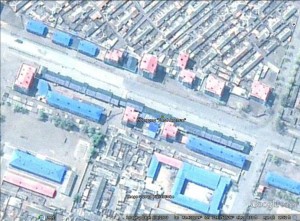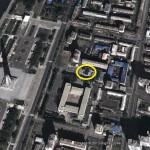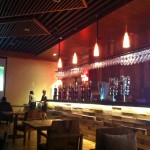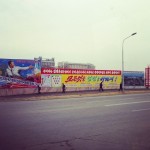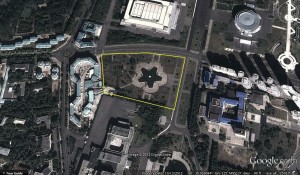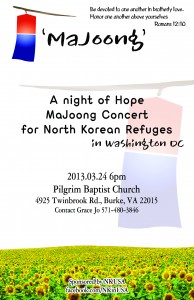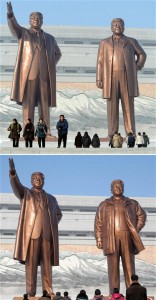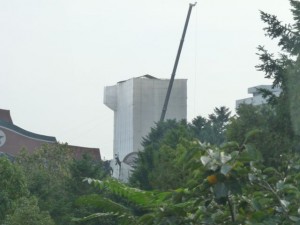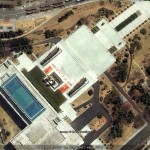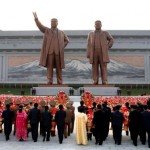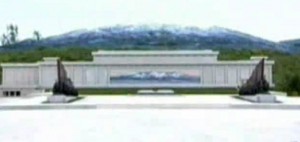UPDATE 3 (2013-12-1): Macleans has more information on how Rodman arranged his second trip to the DPRK:
Sometime last spring, Dennis Rodman, the unpredictable, flamboyant NBA hall of famer, found he had a problem: How was he going to get back into North Korea?
As it happened, Rodman had a standing invitation from that hermetic country’s supreme leader, Kim Jong Un—a man Rodman has described as “my friend” ever since his first trip to the Democratic People’s Republic of Korea (DPRK) last March. But, the DPRK is not an easy holiday destination, and Kim hadn’t offered to send a personal jet.
Rodman’s first trip had been worry-free—it was arranged by the in-your-face media company Vice, which used Rodman’s allure as a former Chicago Bull (the ruling Kim dynasty has an enduring fascination with the team) to gain entry to the country and shoot an HBO documentary. But the Vice crew’s anti-Kim agenda had left North Korean officials, and Rodman himself, nonplussed. This time, Rodman wanted to go unencumbered by cameras and press people. So what to do?
“They tried to go to a travel agent, I guess, but obviously it doesn’t work that way,” says Joseph Terwilliger, a geneticist at the Columbia University Medical Center, who got involved in Rodman’s quest after successfully bidding on a basketball game with him at a charity auction. The pair shot hoops, but mainly they talked North Korea.
Terwilliger told Rodman he knew exactly who could help: Michael Spavor, a Canadian he’d first met at the bar of the Yanggakdo International Hotel in Pyongyang some years ago, and who has developed a reputation for being one of those rare things—a foreigner whom the North Koreans have come to trust, and who can get things done in that country.
Spavor, 38, is not what you’d expect from an emissary to North Korea. An affable, mild-mannered type who grew up in a Calgary suburb, he first became intrigued by North Korea during a short stay in Seoul in the late 1990s, when, flipping through the Lonely Planet travel guide, he stumbled across the section on the DPRK—“just a little sliver in the back,” he recalls. “It was the most interesting part of the whole book.”
He went on to live in Pyongyang for six months in 2005, working as a teacher at a school affiliated with a Vancouver-based NGO. He’s been in and out of the DPRK ever since, developing key contacts in the regime along the way. Spavor speaks the North Korean dialect—a more formal variant of the southern—so fluently that he fools people on the phone, and he ran a school specializing in DPRK Korean in Yanji, the city in a largely Korean corner of northeast China where he now lives.
Not your typical line of work, and occasionally it raises eyebrows. Passing through the U.S. a few weeks ago, his unusual travel itinerary raised red flags with a customs official. Spavor asked if the officer had heard about Rodman’s trip to North Korea in early September. Sure, he had. “I organized it,” Spavor told him. “It was a blast.”
It was, in some ways, a bro vacation. Rodman’s entourage included; Christopher Volo, a mixed-martial-arts fighter, and Terwilliger, the Columbia prof, who also happens to be a pro tuba player. Terwilliger had become fascinated by the DPRK as a kid listening to shortwave radio from Pyongyang; he’d been on North Korea’s propaganda mailing list for years and found the material he received “interesting.” Together, the men sang, drank, ate and laughed with Marshall Kim, as he likes to be known, at his seaside retreat, a “seven-star” home-away-from-home that Rodman later compared to Ibiza.
“In the media, Marshall Kim Jung Un is portrayed as serious,” Spavor told Maclean’s in an interview. “But we were able to see a more charismatic, friendly side to him. He has a good sense of humour.”
Spavor carries official pictures, taken by a state photographer, of the encounter on his iPhone, and though he’s wary of whom he shows them to—Spavor is fastidiously careful in regards to everything DPRK-related—it’s clear from the shots that this was a casual affair enjoyed by Rodman, his entourage, and by Kim, who is thought to be around 30.
“Dennis and Marshall Kim talked, and Michael and I tried to translate as much as we could,” explains Terwilliger.
Then he corrects himself.
“I mean, Michael translated as much as he could to Korean,” he says. “I was more translating Dennis to English.”
The two Rodman visits to North Korea have received their share of ridicule—North Korea, after all, is a pariah state, with a troubling human rights record and a history of threatening its enemies, including the U.S., with nuclear destruction. But, Spavor, who has led many similar, though lower-profile, cultural-exchange tours there—students and faculty from Cambridge, Harvard and McGill have seen North Korea from the inside, thanks to his ministrations—saw Rodman’s visits as “a chance for international relationship-building, in this case, through the medium of sport.”
Asked if such an endeavour makes him an apologist for what many consider a pretty nasty regime, Spavor won’t be drawn in. “I’m really in no position to comment on political and human rights issues,” he says. “Those issues are better discussed between governments.”
During his time living in Pyongyang, Spavor was able to observe “regular, everyday life”—people going to work, young couples walking hand-in-hand, vibrant markets. “I met a lot of really beautiful people—so sweet,” he says. “It was contrary to what I’d heard, that they were cold. You hear about this mysterious, unfriendly place.”
He credits his good contacts in North Korea with his capacity to interact with the North Koreans on their own terms—a rapport he picked up while eating, drinking and singing with them during his brief time living there. “I really learned how to party with North Koreans—to party and enjoy myself in their environment,” he says. “I have a rare and odd skill that enables me to connect the DPRK to other people.” Spavor celebrated his birthday in North Korea in November, feasting on North Korean birthday cake, which he says was delicious.
It was his relationship with the North Korean regime that helped Spavor spirit Rodman through Beijing, where the basketball legend sought to keep a low profile, and onto a flight with Air Koryo, the North Korean airline. “You know, it’s not easy hiding a six-foot-seven black guy with tongue piercings and tattoos in China,” says Terwilliger.
Indeed, Spavor has carved out a reputation as a street-smart, savvy conduit, someone the North Koreans know is capable of discretion.
“If you sent a traditionally diplomatically minded person, it would be very difficult for such a person to deal with North Korea,” says Andrei Lankov, a professor at Kookmin University in Seoul and a leading authority on North Korea. “Michael has a great deal of common sense, and he’s a very normal guy, but also very smart. He understands the society and he’s not afraid to experiment and do things that are unusual.” Hence, Spavor’s willingness to engage with the North Koreans on the basketball court.
Spavor’s unusual relationship with the North Koreans is driving plans, bankrolled by the colourful Irish bookmaking company Paddy Power, to mount a basketball exchange between the U.S. and the DPRK in January, when between 10 and 12 former NBA players—Spavor won’t name names—are due to arrive in Pyongyang to help coach North Korea’s national basketball team.
And it is Spavor, as a Canadian, whom officials in North Korea’s ministry of sport approached with the idea of setting up a hockey exchange between North Korea and Canada. The project is still in its early stages, but Spavor says there is interest from the NHL. He envisions NHL players and coaches arriving next autumn or winter to help train the country’s national team. As it turns out, the North Koreans do play hockey, in the International Ice Hockey Federation’s Division III category, which also includes such lesser hockey nations as South Africa, Ireland and Greece. He’s also looking into organizing another sports exchange between North Korea and Canada—this one centred on skiing (the DPRK is poised to open its first ski resort, at the Masik Pass, on the country’s east coast).
The DPRK is borrowing from American culture in other ways, too. Spavor carries with him the Samjiyon, a North Korean-made tablet computer loaded with North Korean books, and with the republic’s answer to Angry Birds, a computer game called Gomuchong—rubber gun—that looks remarkably similar to the one-time iPhone sensation. Another stab at a cultural exchange? Perhaps. It may also be piracy.
UPDATE 2 (2013-9-8): Just as Kenji Fujimoto taught us the name of Kim Jong-un, Rodman has revealed to the world the name of Kim Jong-un’s daughter. According to The Guardian:
Dennis Rodman has already described Kim as an “awesome guy”. On Sunday, he told the Guardian the leader was also a “good dad” to his baby daughter, whom he named as Ju-ae.
“The Marshal Kim and I had a relaxing time by the sea with his family,” Rodman said of his recent visit to the world’s most isolated country. “We shared many meals and drinks where we discussed our plans to play a historic friendship basketball game between North Korea and the US as well as ways to develop their basketball team.”
“I held their baby Ju-ae and spoke with Ms Ri [Sol-Ju, Kim’s wife] as well. He’s a good dad and has a beautiful family. Kim told me, ‘I’ll see you in December.'”
Rodman plans to organise a basketball game between American and Korean teams.
“Kim is a great guy, he loves basketball, and he’s interested in building trust and understanding through sport and cultural exchanges,” Rodman said. “I know in time Americans will see I’m just trying to help us all get along and see eye to eye through basketball and with my friendship with Kim I know this will happen.” Further details on the basketball match are expected on Monday.
If the Rodman in Pyongyang story wasn’t unusual enough, there is an extra twist – it is being sponsored by an Irish bookmaking firm, which cheerfully admits it has no experience of international diplomacy.
Paddy Power used Rodman for a promotional stunt involving bets about the new pope, after which the eponymous son of the founder of the firm went for “pizza and a few glasses of wine” with the ex-NBA star in Rome. Rodman then explained his “basketball diplomacy” idea.
Despite thinking it was “all a bit bonkers”, Power decided to get involved. He said: “If you’d told me about this 12 months ago I’d have got the men in white coats to take you away. It’s an unusual idea to say the least.”
Power stressed that the project did not mean that the company or Rodman “endorse or support” one of the world’s most repressive regimes, which has an appalling human rights record.
The company consulted a Korea expert at the International Crisis Group thinktank, which argues that this is not entirely a stunt.
“Someone might say that Dennis Rodman provides political legitimacy to the regime, or it can be treated as a propaganda coup,” said ICG’s Daniel Pinkston, who has been an expert on North Korea for 30 years. “I think that’s greatly exaggerated. If you have a former president of the United States, that factor might be much greater. But someone like Dennis Rodman can’t do that. He can’t lift sanctions – he doesn’t have that power or authority.”
“The risks and costs are very, very low, and what you’re creating is a channel for the exchange of ideas. It’s a very small channel, but it’s there.”
He said the interaction between Kim and Rodman sent out a signal to the world – and to North Koreans. “Here’s someone who’s one of the most nonconformist individuals you can think of. And here’s the leader, embracing him. That is an implicit signal – it’s OK to be different.”
The New York Times also reports:
On Monday, Mr. Rodman said Mr. Kim gave him the right to write a book about him.
…
Mr. Rodman said he would put together a team of 12 former N.B.A. stars to travel to Pyongyang in January for one week. He said he hoped to recruit people like his former Chicago Bulls teammate Scottie Pippen and Karl Malone. They will play a North Korean team on Jan. 8 and another game two days later, he said. Mr. Kim promised a stadium and 95,000 fans.
Mr. Rodman said he planned to travel to Pyongyang in December to help select and prepare a North Korean team. A second set of games between the teams will be played in June in Europe, according to an agreement between the North Korean minister of sports and Mr. Rodman that was read during the news conference on Monday.
Mr. Rodman said he accepted Mr. Kim’s request for him to train the North’s Olympic basketball team.
UPDATE 1 (2013-9-7): Reuters reports that Dennis Rodman has left without Kenneth Bae.
Former U.S. basketball star Dennis Rodman returned on Saturday from his second visit to North Korea this year where he again met the reclusive country’s leader Kim Jong-un, but did not come back with jailed American missionary Kenneth Bae.
…
“That’s not my job to ask about Kenneth Bae. Ask Obama about that. Ask Hillary Clinton,” he told a throng of reporters. “I don’t give a shit.”
…
Rodman showed reporters in Beijing pictures of him meeting Kim, and said he had given Kim a gift of his Bad Boy vodka, which “he loved”.
“He is my friend for life. I don’t care what you guys think about him. I don’t give a shit about what people around the world think about him,” he added.
Rodman’s latest trip was sponsored by Irish bookmaker Paddy Power.
ORIGINAL POST (2013-9-7): Back in February Dennis Rodman made headlines by visiting the DPRK with the Harlem Globetrotters for a trip arranged by the new Vice show on HBO.
On September 3, Rodman returned to the DPRK for his second trip.
Here is coverage in Rodong Sinmun:
Supreme leader Kim Jong Un met ex-NBA star Dennis Rodman and his party on a visit to the DPRK.
He warmly greeted them and had a cordial talk with them.
Warmly welcoming Dennis Rodman visiting the DPRK again as a friend in a good season, Kim Jong Un told him that he might visit the DPRK any time and spend pleasant days, having a rest.
Saying he feels very grateful to Kim Jong Un for sparing a precious time to meet him and his party despite his tight schedule, Dennis Rodman said this is an expression of good faith towards the Americans.
He said that he was fortunate to revisit the DPRK as he has friendly relations with broad-minded Marshal Kim Jong Un.
Dennis Rodman evinced his will to contribute to boosting diverse sports and cultural exchange with the DPRK.
He presented Kim Jong Un and his wife Ri Sol Ju with a gift he prepared with the deepest respect for them.
Kim Jong Un, together with him and his party, watched a basketball match between the April 25 Team and the Amnokgang Team.
Kim Jong Un hosted a dinner for Dennis Rodman and his party.
Expressing his heartfelt thanks to Kim Jong Un for spending a lot of time for him and his party and according them the warmest hospitality, Dennis Rodman said he would remember this visit as an unforgettable beautiful memory all his life.

